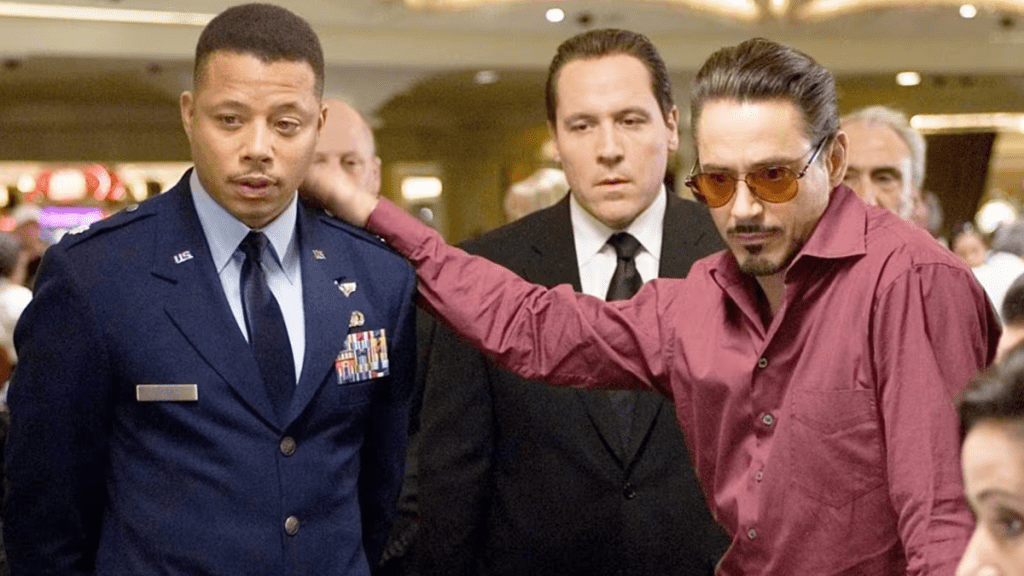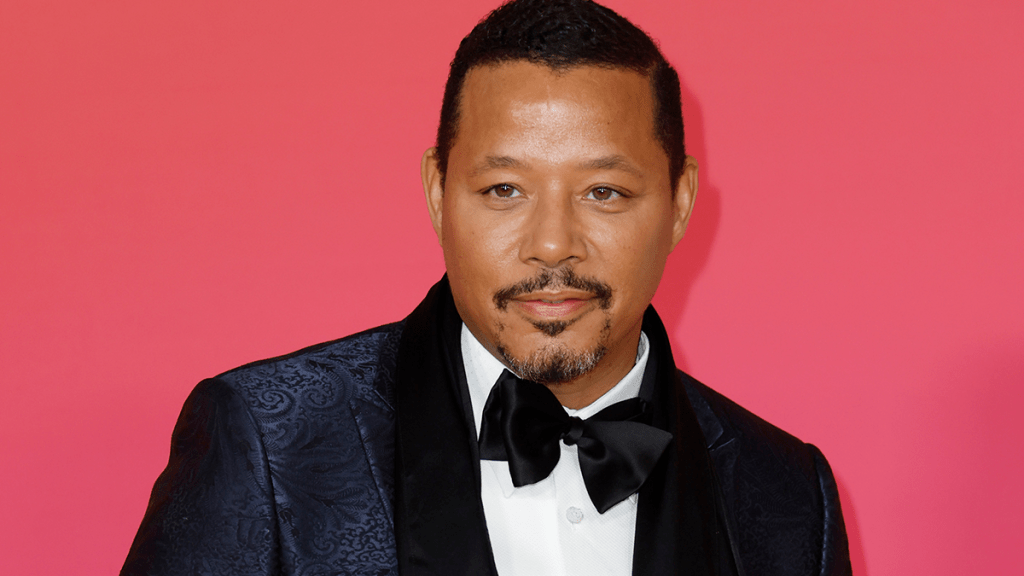ComingSoon Editor-in-Chief Tyler Treese spoke with Showdown at the Grand star Terrence Howard about the cinematic action comedy movie. Howard spoke about how the film industry is changing and his time in the Marvel Cinematic Universe. Showdown and the Grand is out now digitally and in select theaters and will be released on Blu-ray and DVD on Tuesday, December 12.
“A proud movie theater owner, George Fuller (Terrence Howard), must defend his family business from corporate developers alongside a legendary action star, Claude Luc Hallyday (Dolph Lundgren), as art imitates life in a showdown for the ages,” reads the movie‘s synopsis.
(Note: This was conducted prior to the SAG strike ending as the film had an interim agreement.)
Tyler Treese: There are some great scenes with the sword in Showdown at the Grand. Seeing that Western imagery with the sword is just inherently cool. You get to use a lot of weapons in the movie, so what was the highlight for you in terms of the action sequences?
Terrence Howard: The idea of George ultimately going and battling against Lynn and things of that nature … George, I don’t think, was a violent person. I think he’s one of those people that was just … it’s the falling down kind of syndrome that’s happening to a lot of us. But yeah, I love the fact that George really didn’t know how to use a sword at all. It was just a grown kid doing the very best that he could. So that was the beauty of the highlighted stuff, for me, was just the fact that this kid was not prepared to go to war but was willing to do whatever he had to in order to save this theater.
The movie industry is all over this film. It’s about an aging action star and this movie theater that is seen as far past its glory days. What about those elements really spoke to you?
Yeah, here we are at the very end of the golden years of Hollywood, you know? We’re seeing a lot of the individuals that we thought had golden parachutes … those golden parachutes are completely gone. And you’re left here in this industry where no one’s making money anymore. The theaters are now dying because the studios who used to use the theaters primarily took it from the people and turned it into just a movie theater. Whereas the theater used to be the center for all kinds of commerce inside of a business, now it’s just to make a little bit of money. Now that everything’s gone to streamers, the theater owners are suffering the most, and the people and the culture will suffer the most because it’s a lack of centralized creativity and centralized responsibilities.
We’re losing our culture and our tradition. That’s what’s happening by the death of the theater. Even though everyone has this immediate one-on-one media reaction with social media and things of that nature, reacting with yourself in the mirror is a lot different from reacting from your peers and your family and your neighbors when you have to look at them across the aisle in theater as you discover everything else about you.
The film is sort of “one last hurrah” for the theater and Dolph Lundgren’s character, and you get some really great action near the end. In the back half, you get to kick alongside Dolph Lundgren. It doesn’t get better than that, right?
No, it doesn’t. The idea of what we were trying to do — and I’m a little starstruck, in a sense, of this moment because you’re the very first person to interview this whole film. It’s kind of nostalgic for me because it’s a kind of film I never expected to make and didn’t know how we were going to make it. But I was so proud of it when I finally saw what we did, and the heart that it has, that’s what I loved about. It may be corny in places, but it’s just all heart. That’s what I loved about it.
Yeah, it definitely comes through in the film. What was it that really impressed you about working with the director, Orson Oblowitz?
Well, Orson was open to exploring. He wanted to make a badass character. He got up there and he was ready for George just to go to war. I thought that George wasn’t as skilled a fighter as Orson had initially in mind, so I made George a little sloppier and a lot of the stuff that he was doing was haphazardly accomplishing his goals, and Orson was really open to that. He was really comforting and understood the nature of what George was really fighting: this autistic cat. He’s definitely very, very autistic … high functioning autistic. But I loved his compassion and his understanding of an actor’s choice to not be so “John Wayne,” even though, at the end of the day, he ended up being John Wayne in a sense.
It’s an interesting character because he’s definitely taking inspiration from the films that he loves so much, and it’s fun to see him try to act that way, even if he doesn’t really have the skill or experience to pull it off. I like that theme where it all connects back to the movies and how they’re almost fighting for that shared experience and what brings everybody to the Grand Theater.
It was great that Dolph was the one that had taught him how to shoot a bow and arrow. Dolph was the one that taught him how to play with a sword. Those are all the things that guy that he watched in the films from him. All of his motions and movements were things that he had actually seen in the theater. I love the reflection of joy, because that’s what he’s looking at when he looks in the mirror and his emotional mirror — he’s looking at himself and the simplicity and the innocence of the child and to lose that child as we get older, as we all do. That’s pretty much the last thing that goes, and probably the last thing that returns right before you die. It’s that innocence of who you were before. If we can capture that and hold on to it, I think we’ll be a much better society. It’s when we forget the innocence that brought us to where we are, that we end up dead.
Last year, you spoke about retiring as an actor. Is that still the plan? Are you looking to maybe be involved as a producer or creative in other avenues instead?
Well, I think that this is the last dance for all actors, for the most part. If you really think about the battle that’s going on with the Screen Actors Guild and the studios — the rights to our image, the rights to being able to maintain a character. But how do you do that when you’ve signed away so many of your rights and the studios have taken advantage of it? It only takes a second for them to mix Leo DiCaprio and Al Pacino merge their two characters with AI, and then create a voice for it. Now, it’s a composite work where they never have to pay these actors again.
The actors aren’t getting paid. So I think it would be nice to continue as a producer or something of that nature. But I think that’s all being taken away from us at this point. I think this may be the last hoorah before the machines take over. I mean, literally, the machines take over.

You were such a huge part of kick-starting the MCU with Iron Man. It’s been 15 years and that really became a behemoth itself. I know that ended on a sour note, but with time removed, how do you look back on that period? Are you proud of it?
Well, I mean, I’m always going to feel a little this way and a little that way about it. My wife found the tag yesterday from my flight suit, where it said Rhodes. I wish I could’ve just thrown it away. I wish I could, but there’s, there’s still some identity of Rhodes for me. The fans loved it so much, and I go from being like, “Ah, I don’t care” to, “Damn, I wish that had happened. It would’ve been really great.” I love the fact that we kick-started the Marvel [Cinematic] Universe. I love the fact that we made so much money with that first jumping kick.
So I’ll always be proud of it, but we’ll always wonder what could have been, you know? I hear so many fans out there saying what they thought about Rhodes should be. And I know I said a few years ago, “F— Marvel” or blah blah blah. When I look back at it now, it’s sad that it didn’t happen the way we wanted it to — that’s just me being honest without any guards up or anything. I wish they didn’t play dirty. I wish we had figured out some better way to do that.










